Organic protein powders are derived from ingredients that are grown and raised without synthetic pesticides, herbicides, and fertilizers.
These compounds often contain toxic chemicals that can make their way into your foods—including your protein powder.
As a result, organic protein powders are popular among people who want the fitness benefits of protein and the health benefits of organically sourced food ingredients.
If that’s up your alley, you’re in the right place. Our research team has combed through the wide range of protein powders on the market to come up with the best organic protein powders that you can get.
Research
Rankings
1. Performance Lab SPORT Protein
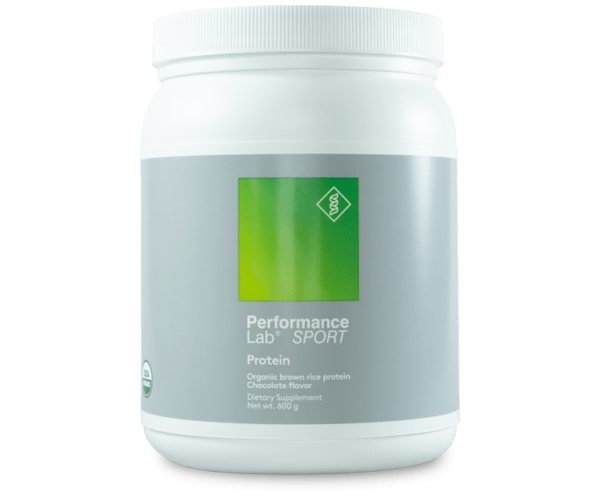
Click here for the lowest price
If you want the cleanest and greenest organic protein, then look no further.
Performance Lab® has built its reputation on purity, and SPORT Protein is a predictably flawless product.
It’s 100% natural and plant based. It has no fillers, no artificial flavorings, no soy, and no synthetics. It’s free of any nasty chemical processing that some animal – and even plant – proteins go through before they reach you.
Instead it features Oryzatein® – the world’s first patented, and USDA certified-organic, whole brown rice protein. It’s been clinically shown to be as effective as whey for building lean muscle – and it tastes amazing.
The smooth, chocolaty blend of organic cocoa, vanilla, and Ceylon cinnamon means going organic can still taste great.
2. Natural Force Organic Whey
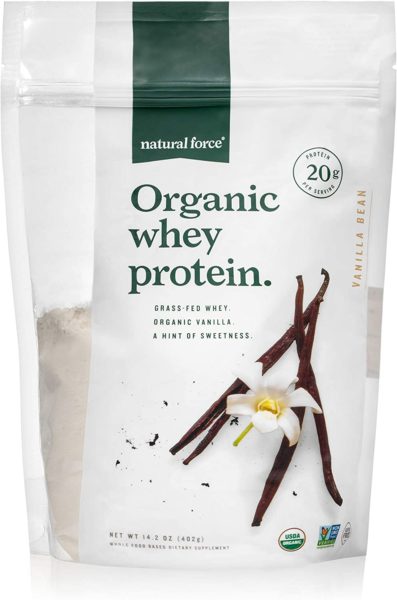
Most protein powders that are organic default to using plant proteins, because it’s more difficult to raise organic cows for dairy products, like the milk that whey protein is derived from.
Not Natural Force, though. This organic protein powder is highly pure, with just three ingredients: organic whey protein, organic cocoa powder, and organic stevia leaf extract as a natural, non-caloric sweetener.
No emulsifiers, additives, or artificial ingredients to be seen here. This supplement is an excellent choice because it lets you gain all the benefits of whey protein (i.e. rapid absorption, balanced amino acid profile, and unique muscle strengthening abilities) along with the benefits of going organic.
3. Kos Organic Vegan Plant Based Protein
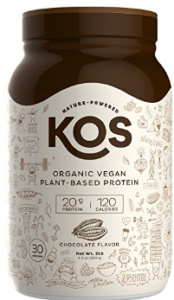
Kos uses a unique blend of pea, flax, quinoa, pumpkin seed, and chia seed to get an unparalleled level of variety in its protein sources.
On top of this, it uses a combination of coconut sugar, agave, monk fruit, and natural flavors to sweeten and improve the taste of its protein powder.
Add to this the presence of several digestive enzymes and you’ve got a high-quality protein powder that is both vegan and organic, making it one of the best options for plant-based organic protein.
4. Ora So Lean & So Clean
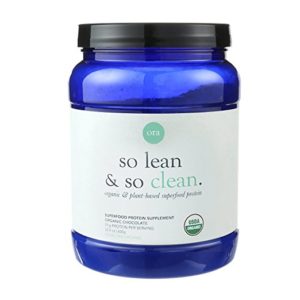
Ora makes an organic protein powder that uses a pea, rice, and hemp protein base, but adds in over a dozen superfood ingredients, like turmeric, artichoke, coconut, and kale.
It’s flavored only with the purest natural ingredients, like vanilla bean extract and monk fruit extract. It even includes three enzymes for easy digestion and rapid absorption.
Thanks to its high protein content and the inclusion of a wide range of superfoods, it’s a top pick.
5. Garden of Life Raw Organic Protein
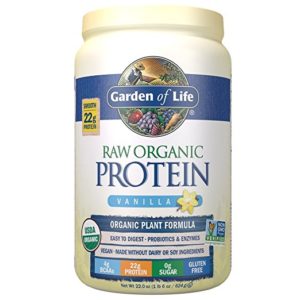
Garden of Life offers a protein powder that’s primarily made up of by brown rice and pea protein, but a large proportion of its protein content comes from the huge range of seeds and grains included alongside these protein concentrates.
Garden of Life specializes in supplements derived from ingredients as close to their natural form as possible, and that’s certainly the case here.
The value of Garden of Life Raw Organic Protein isn’t just in the protein content; it’s in the wide range of organic superfood ingredients that come alongside. Even the flavorings are derived from organic plant extracts.
6. Orgain Organic Protein
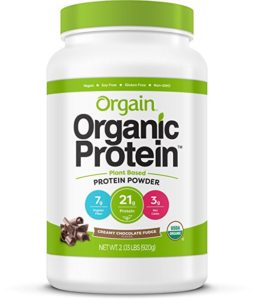
Orgain makes a good all-around protein powder with a pea, brown rice, and chia seed protein base.
Added to this is a mixture of emulsifiers (all organic) that make it easy to blend and froth up this protein when it’s added to water.
It is flavored only with natural flavors, stevia, and cocoa, so it achieves taste without diluting the supplement with excessive and artificial ingredients. It’s still a bit much for people who want a strict, minimalist protein supplement, but for people who value usability, it’s a great choice.
7. Optimum Nutrition Gold Standard 100% Plant Protein
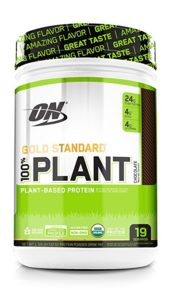
Optimum Nutrition is a leader with many of its protein products, and its plant based protein does well to cater to the organic crowd.
It uses pea protein, brown rice protein, and sacha inchi protein, alongside a blend of grains like amaranth and buckwheat for a more balanced amino acid profile.
It’s a solid organic protein powder without any real distinguishing features, but without any real downsides either.
8. LivFit Organic Plant Protein
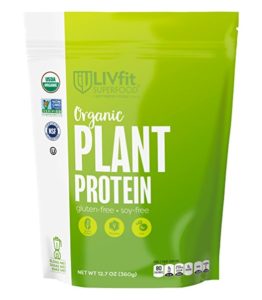
LivFit makes a simple and straightforward protein powder with just three ingredients: pea protein, quinoa powder, and agave inulin as a sweetener.
This is very appealing to fans of minimal supplement design, though the amino acid profile won’t be quite as strong as if it had another source of plant-based protein to balance out the pea protein powder.
It may be slightly more difficult to mix up into a shake due to the lack of any mixing aids, but it’s still a pretty good product.
9. Purely Inspired Organic Protein
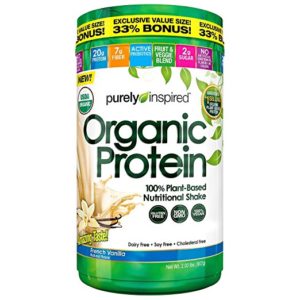
Purely Inspired Organic Protein uses a combination of pea protein and rice protein for a solid amino acid balance. It has a blend of vegetable extracts and concentrates for some superfood power, but it also contains a few too many additives and emulsifiers.
The use of cane sugar, albeit in only a small amount, won’t make low carb enthusiasts happy either. Still, despite these drawbacks, it’s not a bad protein powder all things considered.
10. Aloha Organic Plant Based Protein Powder
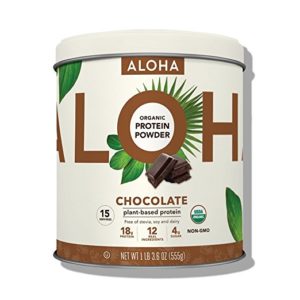
Aloha is somewhat unique in its use of coconut derivatives alongside pea protein, pumpkin seed protein, and hemp seed protein in its organic protein blend.
The sugar content isn’t outrageous—just 7 grams per serving, but since each serving also only contains 18 grams of protein, you’ll be getting a fairly high dose of sugar if you use Aloha for a large proportion of your daily protein intake.
Category winners
Best organic protein powder overall: Performance Lab SPORT Protein
Performance Lab SPORT combines organic brown rice protein with probiotics and natural flavors from cocoa, yacon, and coconuts. This performance-oriented blend makes it our top overall pick.
Best organic protein powder for athletes: Performance Lab SPORT Protein
Performance Lab SPORT goes beyond your typical athlete-oriented protein powder by providing probiotic bacteria that assist with digestion and absorption, which is particularly helpful after tough workouts. Thanks to this clever formulation, we wholeheartedly recommend it for athletes.
Best organic protein powder for women: Natural Force Organic Whey
Natural Force Organic Whey is great for women, whether their goal is weight loss or muscle recovery. This ultra-pure organic whey protein has no artificial sweeteners or synthetic additives, and provides unparalleled muscle repair capabilities thanks to the amino acid profile of whey protein.
Best organic protein powder for muscle mass: Kos Organic Vegan Plant Based Protein
Kos uses a broad range of plant-based proteins, which gives it the full spectrum of essential amino acids. Add to that a few digestive enzymes and naturally-sourced flavorings, and you’ve got a great product for putting on muscle mass with clean, organic protein.
Best organic whey protein powder: Natural Force Organic Whey
Natural Force uses dairy from grass-fed and organically raised cows as a source for this ultra-pure protein powder. With the only other ingredient being a dash of vanilla flavor, it’s our recommendation if you’re looking for organic whey protein.
Best vegan organic protein powder: Kos Organic Vegan Plant Based Protein
Since Kos Organic Vegan Plant Based Protein relies on so many different plant-based sources for protein (pea, flax, quinoa, pumpkin seed, and chia seed), you get a huge variety of amino acids in this protein powder. Since vegan diets are often sparse when it comes to varied sources of protein, Kos is an easy pick for vegans.
Who should buy organic protein powder?
Organic protein powder is specially formulated and certified by independent agencies to ensure that the protein source used in the supplement is made naturally without any antibiotics, hormones, pesticides, or herbicides.
Oftentimes, high quality organic protein powder comes from lactose-free or vegan protein sources, but not always—plenty of whey protein powder products are available that are certified organic too. Why might organic protein powder be a better idea than regular protein powder?
First off, if you are concerned about the potential for insecticides, herbicides, hormones, or antibiotics making their way into your protein powder, an organic protein powder is definitely the way to go.
Second, you can use organic certification as a surrogate marker of overall protein quality. It’s no accident that many of the best overall vegan protein powders and whey protein powders happen to be organically certified: organic certification typically correlates well with overall quality.
That’s because getting certified as an organic product requires sticking to rigorous manufacturing practices, and having tight control of your ingredient supply chain, all the way from how the plants were grown or the cows were grazed up to the additional ingredients like emulsifiers and flavoring agents that are added further down the line.
So, if you need a good heuristic for protein powder quality, organic protein powder is a pretty good one. A typical organic protein powder selected randomly from the shelf will be higher in quality, on average, than a typical non-organic protein powder.
Indeed, many of the brands on our rankings of the top organic protein powders also made top overall rankings for specific kinds of protein, like vegan protein, paleo protein, or pea protein. If you’re strapped for cash, it might be more efficient to opt for regular protein, assuming you aren’t hyper-conscious about trace amounts of non-organic ingredients.
You can usually get more bang for your buck with non-organic protein, because of the additional effort and cost that go into developing an organic protein product and getting it certified as organic.
How we ranked
Our procedure for finding the top organic protein powders on the market was pretty straightforward. We started by making a list of all of the protein powder products that have been certified to meet the United States Department of Agriculture’s organic certification requirements.
These requirements, which are legally codified, stipulate the conditions under which something can be legally sold as “organic.” For dairy-based products, like whey or casein protein, the rules say that the cow from which the milk came must have not been treated with antibiotics, not given hormones, and have been grazed on a pasture for at least 30 percent of its diet (1).
For plant-based products, like pea protein or soy protein, the original plant must have been grown without any of the prohibited fertilizers, herbicides, or insecticides (like glycophosphate), and moreover, the plant must have been grown on soil that has not been treated with any of those prohibited substances in the past three years (2).
Organic fields also need a buffer zone to prevent accidental contamination by chemicals applied to adjacent fields.
The products that passed these requirements were eligible for inclusion on our list, but we also put strong requirements on purity and clean supplement design.
We removed from consideration any products that used synthetic flavoring, coloring, or sweeteners. We had a preference for pure, unadulterated protein powder, but we did also include products that used high-quality natural flavors like cocoa and cacao powder, or all-natural non-caloric sweeteners like stevia. Products that used added sugars, even in small amounts, were penalized heavily or dropped completely.
We only considered products whose primary goal was maximum protein delivery—while there are some good pre-mixed meal replacement or protein shake products out there that use organic protein, these can dilute the protein content below what a serious athlete might need. We dropped these products from consideration, focusing instead on protein-oriented supplements only.
For products that were vegan-friendly, we looked favorably on multi-ingredient sources of protein. That’s because plant-based proteins don’t have quite the same level of broad-spectrum amino acid content that an animal-based protein like whey or bone broth protein has.
Plant-based protein can overcome this drawback by combining several sources of protein—though as you can imagine, this makes getting an organic certification more difficult, so this strategy is rare.
With the remaining products, we combined the above factors, resulting in our final list of the top organic protein powders on the market.
If you’re concerned about the purity of the protein you take every day, or if you want a simple barometer for overall protein quality, you’ll find the best options for organic protein on our list.
Benefits
Protein powder is so tremendously useful that it hardly needs an introduction. If you want to gain muscle, lose fat, tamp down on your appetite, or increase your speed, strength, and power, protein powder is the way to do it.
However, one concern with traditional protein powders is that they aren’t sourced from organic ingredients. This means that they could have trace amounts of pesticides or fertilizers, which you likely don’t want getting inside your body.
Organic protein powders offer a solution to this–the primary ingredients in an organic protein powder must be grown and raised according to strict legal standards, and organic farming operations must pass an inspection before they can advertise their products as organic.
In turn, any food product that labels itself as organic must contain at least 95% organic ingredients to legally carry the “organic” label.
Organic protein powder contains fewer harmful pesticides and more nutrients. Because organic foods are grown without synthetic pesticides and fertilizers, they have a strong tendency to be more nutrient dense and are less likely to contain toxic chemicals that are harmful to your body.
This was the conclusion of a 2010 study by Walter Crinnion in the Alternative Medicine Review that examined the nutrition and health implications of growing food organically (3).
By looking at dozens of comparative studies on organic versus conventional means of growing foods (like the plants that eventually make their way into protein powders), Crinnion concluded that, in general, organically grown plants are more dense in nutrients and have lower levels of pesticides.
The pesticides angle is easy to understand—since they aren’t used in the growing process, they don’t end up in the final product.
In terms of nutrients, Crinnion argues that the soil that organic plants are grown in tends to be less depleted than it would’ve been in conventional farming practices, leading to a greater uptake of nutrients by the organically grown plants.
Organic whey protein might be more nutritious than standard whey protein. No research has specifically examined whey protein derived from organic versus conventional milk, but there has been scientific investigation into the differences between organic versus conventional milk, and of course whey protein is derived from milk.
On that front, research by K.A. Ellis and fellow researchers at the University of Glasgow in the United Kingdom compared the nutrient content of organic and conventional milk raised by 36 different farms across the UK (4).
The researchers took samples of the milk from each farm and ran a series of chemical tests to evaluate their nutrient content. They found that the organic milk contained greater levels of polyunsaturated fats, and particularly notable increases in levels of omega-3 fatty acids.
This suggests that the base material for organic whey protein (i.e. organic milk) is healthier and more nutritious than conventional whey protein.
Organic protein powder offers all the benefits of traditional protein powder. This includes everything from speeding up muscle healing after tough, damaging workouts at the gym to maintaining body fat while dieting and decreasing your appetite.
Protein powder supplements have been shown to aid with everything from decreased muscle soreness (5) to increased muscle mass gain over long-term weight training programs in the elderly (6) to decreasing body fat mass among overweight and obese people (7).
Organic protein powder can help you achieve all of these benefits with all of the above perks.
Organic protein powder can help vegans keep their protein intake high. There are several advantages to a vegan diet, including much higher fiber content and much greater fruit and vegetable intake, compared to a traditional Western diet.
However, some vegans struggle to keep their protein intake high, especially if they are athletes. To be sure, there are plenty of high-protein vegan foods, like tofu, lentils, and tempeh, but it’s not always possible to cook these when you’re in a rush or when you’re on the go.
Scientific research supports this notion: a study published in the American Journal of Clinical Nutrition by a pair of researchers in Sweden noted that vegans had higher intakes of vegetables and legumes, and lower intakes of cakes, cookies, and candy, compared to omnivores from similar backgrounds (8).
However, the vegans did get less protein in their diet than their omnivore counterparts, which could prove to be an issue if they were trying to build up muscle mass or improve athletic performance.
Fortunately, even if you are very conscious about where your food comes from, organic protein powder can help boost your dietary protein intake. Supplemental protein can help you build muscle mass or lose weight, so it’s one of the best supplements out there, both for vegans and for omnivores.
Vegetarians can supplement with protein without losing the health benefits of their diet. Moreover, there’s good scientific evidence that adding supplemental protein to a vegan diet does not negate many of its health benefits.
For example, one study published in 1984 in the journal Hypertension noted that vegans have lower blood pressures than omnivores, and hypothesized that these benefits could be from the lower protein content in vegan diets (9).
To test this hypothesis, the researchers had a group of vegetarians take a 58 gram per day protein supplement (about equivalent to two full scoops of protein) for six weeks. At the start of the study, the vegetarians had significantly lower protein intake than the average person, although their protein intake still met the minimum protein intake recommendations—the idea was to significantly boost protein intake and observe its effect on blood pressure.
The researchers tracked the changes in blood pressure throughout the study and found no significant changes. These findings are good, because they mean that the health benefits (like lower blood pressure) of a vegetarian diet aren’t tied to the protein content alone.
That means that vegetarians can use supplemental protein to gain muscle or lose weight, without losing out on the cardiovascular benefits of vegetarianism.
Side effects
Like all protein powders, organic protein powder is exceedingly safe. The only known side effects occur when you are taking a protein powder derived from something your body doesn’t tolerate well—the classic example here being lactose intolerance or dairy allergies and whey protein.
Even though people with mild to moderate lactose intolerance can usually handle whey protein (most whey protein powders are less than 1% lactose by weight), it’s easy to completely eliminate this problem: just use a lactose-free protein powder.
Recommended dosage
The standard dosage for protein powder is fairly well-established, at least in the exercise physiology literature.
According to a scientific review by Peter Lemon at the University of Western Ontario, endurance athletes should strive for 1.2 to 1.4 grams of protein per kilogram of body mass per day, while strength, power, and speed athletes should aim for 1.6 to 1.8 grams of protein per kilogram of body mass per day (10).
More recently, other researchers have suggested that athletes with the highest protein needs, such as those looking to gain muscle mass, may see benefits of up to 2.5 or even 3 grams of protein per kilogram of body mass per day (11).
Given the excellent safety profile of protein powder, even at high doses, there does not seem to be any major downside to aiming for the high end of the recommended protein intake levels.
FAQ
Q: What should you put in an organic protein shake or smoothie?
A: If you want to stay in keeping with the spirit of using organic protein powder, it’s worth going out of your way to use organic ingredients for the rest of your protein shake or smoothie as well, at least when it comes to primary ingredients.
Bananas, peanut butter, and frozen or fresh fruit are all nutritious and easy to find organic. On top of that, you can add in a green superfood drink mix if you want a quick and easy boost to your antioxidant intake.
Organic whey protein also pairs well with organic milk, and likewise for plant-based proteins: an organic flax milk, oat milk, or almond milk pair great with organic plant-based proteins.
Q: Are there organic protein bars?
A: Yes, there are some organic protein bars out there (some even made our rankings of the best protein bars on the market), though they’re less common than organic protein bars.
The relative rarity of organic protein bars compared to organic protein powder can be explained by the increased difficulty of getting an organic certification on a product with many different ingredients, like a protein bar.
Organic certification requires that at least 95% of the ingredients be organically produced. This means that all the individual ingredients need their own organic sourcing and certification, which complicates the procedure for getting the entire product certified organic.
Q: Is organic protein powder better for you than regular protein powder?
A: When it comes to the science, there’s very little to directly support the idea that organic protein is superior. At the end of the day, organic and regular protein are pretty much identical in terms of the protein and amino acid content.
What makes them different is the potential usage of herbicides, pesticides, and other non-organic ingredients in the growth and manufacturing of the protein. It’s possible that traces of some of these compounds could make it into non-organic protein powders, which forms the basis of the argument for using an organic protein.
If you’re concerned about the potential effects of pesticides and herbicides, organic protein is a good call. But if all you care about is protein content and amino acid makeup, the distinction is less important.
Q: When should you drink organic protein powder?
A: Organic protein powder follows the same rules that govern taking regular protein. After you get in your workout, try to get some protein in your body within about an hour.
If you’re looking to lose weight, take your protein during the morning and/or the middle of the day, so you can take fullest advantage of the appetite suppressing and fat oxidizing properties of protein supplementation.
Q: Is organic protein powder more expensive?
A: Yes, organic protein is usually more expensive than a comparable product. The increase in cost is attributable to the stricter requirements on producing the raw foods used in the manufacturing of the protein powder, as well as costs associated with the organic certification process itself.
To make, for example, an organic whey protein, you need to raise cows that have not been treated with antibiotics or hormones, and that have been grazed on pasture for at least 30% of their diet. On top of that, you also need to have your farming process certified by a licenced organic certification program like the California Certified Organic Farmers or others.
Each of these steps involves some additional cost beyond what a regular whey protein product would cost, which makes up the additional cost on the shelf. The benefits, though, include not having to worry about the effects of pesticides, herbicides, antibiotics, or hormones.
Q: Are there good organic protein powders that do not use sugar?
A: Yes, in fact most of our top-ranked organic protein powders are 100% sugar-free. Protein powder by itself can taste a bit chalky, so adding sweetness and flavor is a common strategy to improve its palatability.
Unfortunately, lower-quality brands just use sugar or artificial sweeteners and flavors to make their protein powder taste better. These kinds of products didn’t make our list, and as you might imagine, are rare to begin with when it comes to organically certified protein powders.
Companies that take shortcuts usually don’t bother with organic certification in the first place. Good organic protein powders that do have sweetness added usually do it with stevia or monk fruit, which are both all-natural non-caloric sweeteners.
Related articles
- Vegan protein powder
- Paleo protein
- Low-carb protein powder
- Pea protein
- Hemp protein
- Almond milk
- Oat milk
Recap
Organic protein powder offers a number of advantages over traditional protein powder for the health-conscious fitness enthusiast.
For both plant-based and milk-derived protein, the base material from which the protein is derived appears to be more nutritious and lower in pesticides compared to ingredients grown and raised through conventional methods.
Given that an organic protein powder has the chance to be more nutrient-dense, healthier, and have fewer pesticides and other toxic chemicals, and that they offer all the same benefits as a traditional protein powder, making the switch to organic makes sense for a lot of people.
For BodyNutrition’s #1 organic protein powder recommendation, click here.